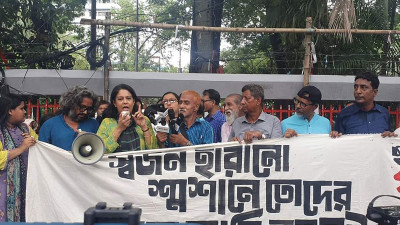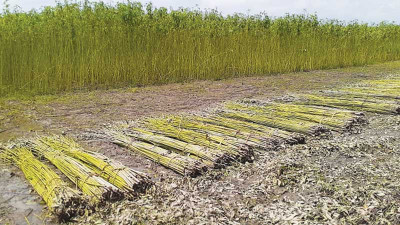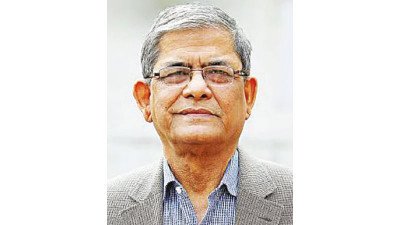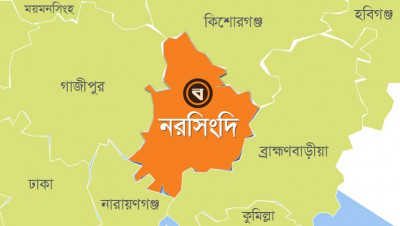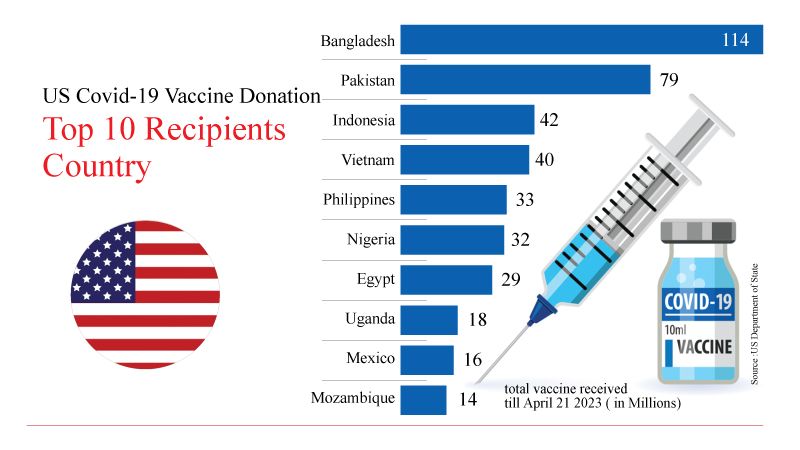
The United States has so far provided nearly 690 million doses of the Covid-19 vaccine for free to 117 countries across the globe. Bangladesh has received the highest chunk of this. In line with the updated data till April 21, the US has given a total of 114 million 570 thousand 820 doses of vaccine to Bangladesh for free. All of these vaccine donations came through a partnership with Covax.
According to the US State Department data, most of the US vaccines given to Bangladesh for free are from Pfizer-108 million 391 thousand doses. Moderna provided a little more than 5.5 million doses. And Johnson & Johnson (J&J) gave 679 thousand 750 doses of vaccine.
The US government has been purchasing these vaccines on contract basis from the manufacturing companies. The average cost of vaccines purchased from Pfizer and Moderna is $20.69 per dose. Taking into consideration the data published by the New York-based health information service organization MedPage Today, the total cost of Pfizer and Moderna vaccines from the country stands at slightly more than 2.35 billion dollars. According to another estimate, the average price per dose of the Jensen vaccine marketed by J&J is close to $10. So far Johnson & Johnson's vaccines have arrived in Bangladesh worth close to 6.5 million dollars. In total, the US has given at least $2.36 billion worth of Covid-19 vaccine grants to Bangladesh so far. According to the current exchange rate, this figure is more than 250 billion in Bangladeshi currency.
However, reports published in various local media in the United States have revealed that the vaccine manufacturing companies are now planning to increase the price of the vaccine. Among them, the US government signed the latest purchase agreement with the vaccine manufacturing company Pfizer in June last year. The cost of Pfizer's vaccine per dose now is $30.48. Earlier, the price of this vaccine was set at 24 dollars and 19 dollars 50 cents respectively in the contracts of July 2021 and 2020. In October last year, Pfizer announced plans to raise the price of the vaccine several times to $110 to $130 per dose. Last month, Moderna also announced plans to raise the price of the vaccine to $130 from the current $26 per dose.
In March 2020 Covid-19 outbreak was reported in Bangladesh. Amidst this global health and economic crisis, the Corona vaccine has become the most sought-after item in the world. The Covid vaccine has become a major diplomatic tool in the geopolitics of various regions of the world including South Asia.
The vaccine competition in South Asia was initially visible only between India and China. Developing countries around India, including Bangladesh, had the highest hopes on New Delhi. Indian vaccine manufacturer Seram Institute took the license to manufacture the vaccine from Oxford-AstraZeneca on the condition of cheap supply in these countries. Apart from this, India was also supposed to supply vaccines to the Covax facility set up by the World Health Organization (WHO) to ensure the vaccination of the countries.
Accordingly, at the beginning of 2021, India started giving free vaccines to her numerous allies. At the outset it created a positive image of the country globally. But with the new type of corona and the flow of infection one after another, the pandemic situation in the whole world was getting worse. The infection was particularly severe in India. Due to various reasons including shortage of raw materials, meeting the local demand had become almost impossible for the Serum Institute. As a result, India imposed restrictions on the export of vaccines for a while. Countries that are dependent on India for vaccines in the region were in deep water.
In this scenario, China entered into this vaccine diplomacy. They increased the supply of vaccines to countries including Bangladesh. Dhaka's dependence on Beijing-supplied vaccines increases, albeit for a short period of time. Within a short period, the United States became the biggest supplier of vaccines for Bangladesh. It also became the largest destination for US vaccine donations.
As of early November 2022, US vaccine donations in the country exceeded 100 million. Peter De Haas, the US ambassador to Bangladesh said in an event at Narayanganj, "This milestone highlights the importance of the strong partnership between our two countries. This is one of the many parts of the great progress Bangladesh has shown in vaccinating nearly 75 percent of its population. This is a remarkable achievement."
Not only vaccination, the United States has helped Bangladesh in many ways during the corona pandemic. According to USAID data, the United States has provided nearly 140 million dollars in aid to Bangladesh to combat the pandemic. Of this, 93 million dollars came as development and humanitarian assistance through USAID. A recent fact sheet of the agency revealed that USAID has helped fight the pandemic in the country by increasing the corona vaccination program, increasing diagnostic and laboratory capacity, improving supply chain and logistics management and raising public awareness.
Health sector stakeholders are claiming that the United States has come forward with vaccination support because of the success of the pandemic management and program. Department of Health Spokesperson Professor Dr. Md. Nazmul Islam told Bonik Barta, "Bangladesh is a role model in the world in terms of vaccination. We have done well in Covid management. Those who have given us vaccines, including the United States, have considered whether we can get them to the right temperature at threshold. In particular, Pfizer vaccines must be stored, transported and administered at specific temperatures. We have been able to apply that vaccine properly even at the root level. All our activities in the field of vaccination management are done according to the instructions and guidelines of the WHO. And they also appreciated our activities. Those who gave us gifts, including the US, took these things into consideration. When they saw that we were able to apply those vaccines correctly, they gave us more vaccines as gifts.
Since the start of the pandemic, US public health policymakers, including Antonio Fauci, have recommended that US vaccine distribution shouldn't become geopolitically biased. In addition, there has been much talk of prioritizing grants in countries where the presence and movement of US citizens is high. Ordinary US citizens also approved of the free vaccinations, so were health professionals. In a 2021 survey, more than 80 percent of US citizens supported providing free vaccinations to relatively low-income countries. Observers say the United States has taken these recommendations and demands into consideration when it comes to vaccine diplomacy. Washington has sent more vaccines to countries where US citizens are most likely to have been exposed to the highest number of foreigners. At the same time, the US has prioritized providing free vaccinations to relatively low-income countries.
A research report by Min Byung Chai, an expert at the University of Chicago's Division of Social Sciences, also supports the issues. The research report on US vaccination grants and assistance to various countries during the Covid was published in New York-based Social Science Research Network (SSRN) in September last year. According to the report, the United States has provided vaccination assistance mainly based on the needs of recipient countries and its allies.
Diplomatic circles believe that factors such as the country's increased focus on the Asian region and its future commercial potential as a hub for South and Southeast Asia have also played a major role in Bangladesh's chunk in the US vaccine supply. However, former ambassador M Humayun Kabir sees bilateral relations as a major factor in this case. He told Bonik Barta, "It seems natural to me that Bangladesh became the biggest destination for the US vaccines during the corona pandemic. They are helping us in various matters including modernization of agriculture, disaster management. They built more than 500 shelters in coastal areas and they did it for no reason. We have multifaceted activities with the US. Bilaterally, we have common grounds on security, political, diplomatic and economic relations. So we have been getting their support financially from that side as well. Now Washington has a greater attention towards the Asian region. They also say that they are giving more importance to Bangladesh as a country with a large population next to the Indian Ocean region. The US President Joe Biden also said this seriously in his speech on the occasion of Bangladesh Independence Day. Besides, they have an opportunity to increase trade with us as a connection point to South and Southeast Asia.


